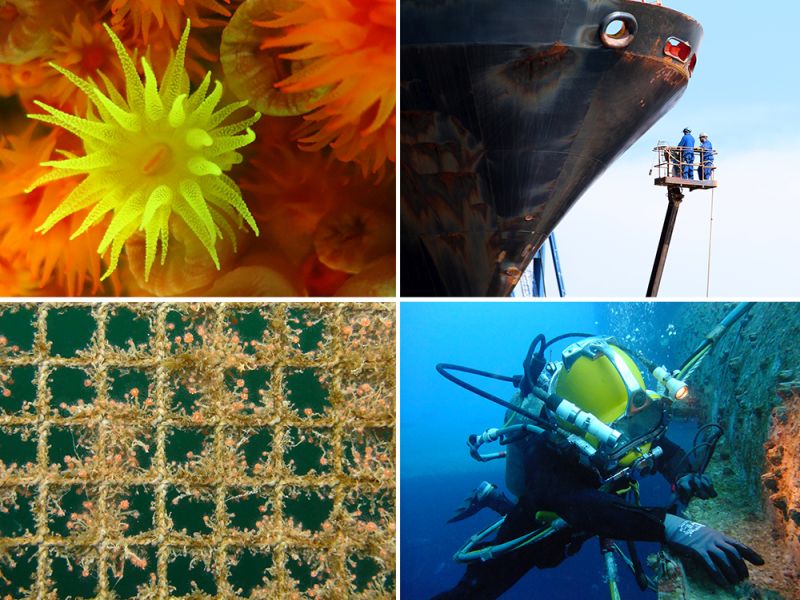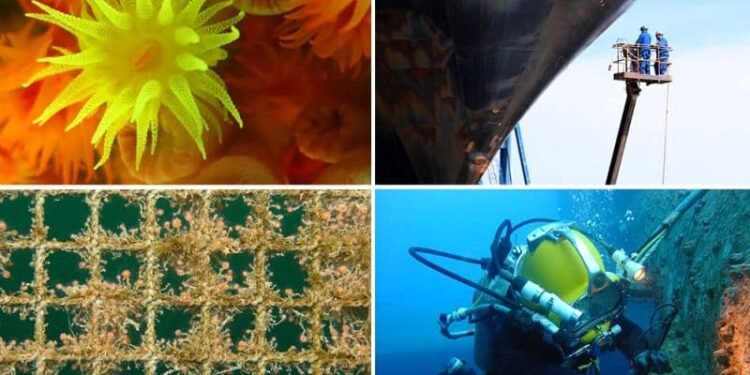Tackling Aquatic Invasive Species Introduced Via Biofouling – GloFouling Task Force Reviews Progress
A major project to tackle bioinvasions by organisms which can build up on ships’ hulls and other marine structures saw activities slow down during the COVID-19 pandemic but is on track to meet its targets. The Global Project Task Force of the IMO-executed GloFouling Partnerships project, a collaboration between the Global Environment Facility (GEF), the United Nations Development Programme (UNDP) and IMO, met for its second meeting (11 to 13 April) at IMO Headquarters in London, United Kingdom.
The project addresses biofouling – the accumulation of algae, animals and microorganisms on the surface of ships. Biofouling plays an important role in the transfer of invasive aquatic species (IAS) from one region to another. Reducing biofouling contributes to the reduction of GHG emissions from ships.
Despite the restrictions imposed by the pandemic, the project moved many activities online and completed a number of reports since the first task force meeting in 2019. Looking ahead, the Project has been extended to 2025. A revised work plan and budget for 2022-2025 was agreed, with the inclusion of a key demonstration event on biofouling management in marine protected areas. This is likely to be conducted in the Galapagos Islands (Ecuador).

An R&D Forum and Exhibition on Biofouling Management, organized by IMO’s GloFouling Partnerships, will be held from 11 to 14 October 2022, at IMO headquarters in London, United Kingdom (further details on how to participate will be available soon.)
During 2020-2021, three lead partnering countries in the project (Indonesia, Jordan, Philippines) delivered training through national institutions and nine others plan to do so during 2022.
All countries have completed national status assessment reports on biofouling management and established a national task force to lead action on biofouling. A number of regional awareness seminars took place online. In 2022, regional task force meetings are planned in four regions, with a view to developing the first draft of regional strategies and action plans.
The project’s Global Industry Alliance (GIA) for Marine Biosafety was established and commissioned and completed a number of reports and studies during 2020-2021.
Despite the pandemic, awareness raising and training continued. During 2020-2021, some 7,000 people registered for 23 online webinars and more than 630 participants engaged in online training opportunities (workshops, seminars) conducted in lead partnering countries. In addition, more than 500 people participated in national and regional policy development events.
Reports, studies and best practice issued during 2020-2021 included: Guide on the development of National Status Assessments on Biofouling Management; Guide to developing a National Biofouling Strategy; and Guide for the development of Rapid Economic Assessments for Biofouling Management and Invasive Aquatic Species. All three guides will be published in 2022.
Reports commissioned by the GIA included: Report – Analysis of existing and emerging regulations, standards and practices related to ships’ biofouling management; Report – Impact of biofouling on fuel consumption and GHG emissions (to be issued in 2022).
A Report on Biofouling Management for Recreational Boating has been developed which includes the result of an online survey on current practices implemented by boaters and marinas (to be published in 2022).
Future reports and guidance in progress include: GESAMP report on the scientific aspects of biofouling and aquatic invasive species introduced via biofouling; report on best practices to manage biofouling in the aquaculture sector; and report on best practices on biofouling management in the offshore oil and gas industry.
Representatives from 11 lead partnering countries, four regional organizations, IOC-UNESCO and numerous strategic partners including from the private sector attended the 2nd Global Project Task Force meeting for the GloFouling Partnerships project.
The 12 Lead Partnering Countries in the GloFouling Partnerships Project are: Brazil, Ecuador, Fiji, Indonesia, Jordan, Madagascar, Mauritius, Mexico, Peru, the Philippines, Sri Lanka and Tonga.
Reference: imo.org














